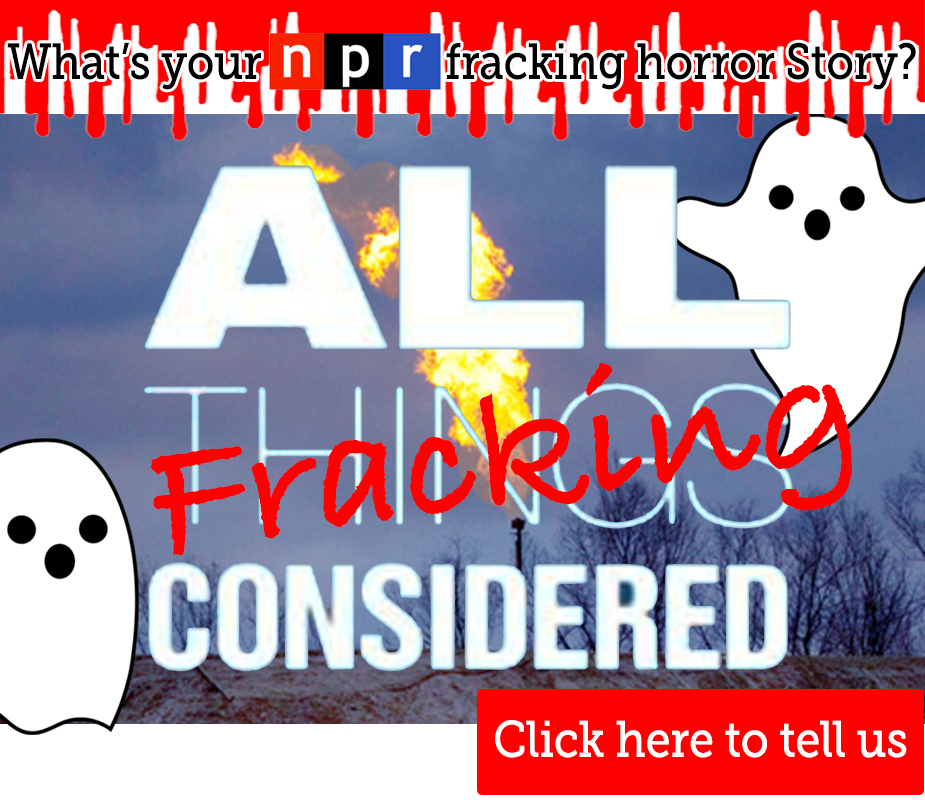|
Friend,
If you're an avid NPR listener like me, you've probably heard one or two "fracking horror stories." I'm talking about the ones that tell you fracked gas is clean-er, safe-er or spurring the economic development of some little town that's just SO GRATEFUL, and then ends with an ad from the American Natural Gas Alliance (ANGA) that tells you to "think about it."
We call them the NPR horror stories, because the coverage of fracking's impacts on our climate, water, air and communities is horrible. Also because, just like the protagonists in most horror movies, NPR keeps walking right into the disaster over and over even though all of us at home are screaming "no, don't go into that, it's obviously a trap!"
Our friends at Beyond Extreme Energy are compiling a list of slanted, inaccurate or misleading stories on NPR about fracking -- but we need YOUR help. Click here to fill out our short survey and tell us all about an NPR story you heard that's horribly slanted in favor of fracked gas. We'll compile all the answers into a damning survey of media bias and deliver it to NPR reporters this fall.

Here's an example from just this weekend: NPR reporter Rachel Martin was interviewing Wyoming Governor Matt Mead about the President's new Clean Power Plan. Meade is no friend to clean power, or President Obama, so it's no surprise that most of the interview is pretty opposed to action on climate. But about halfway through, the NPR reporter, not the pro-fossil-fuel governor, goes out of her way to say, "But even the cleanest version of coal still emits more carbon dioxide than natural gas."1
First of all, fracked gas actually isn't really cleaner than coal if you include the groundwater impacts of fracking, the climate and clean air impacts of leaked methane, and the earthquake risks of disposing fracking fluid afterwords.2 At best it's a zero sum game equivalent to switching to low tar cigarettes -- but where the lungs of the planet get irreparably damaged, not just your own. But more importantly the "cleaner than coal" line is actually a talking point from the fracked gas industry, designed specifically to confuse people into missing the point that ALL fossil fuels are bad, and up to 90 percent of them need to be left in the ground to avoid catastrophe for our planet.3
And that bit of frackwash didn't come from an anti-climate governor or a paid spokesperson for the fracking industry (though those guys get plenty of air time) -- it came from the NPR reporter conducting the interview.
It's as if she were somehow paid or encouraged to slip in nice things about gas, even when the subject of an interview doesn't bring it up; and as if she were equally incentivized to ignore any criticism of fracking or her own appearance of impropriety by saying "natural gas - which of course provides millions of dollars in sponsorship to this radio program." But of course, those ideas are ridiculous according to NPR's ombud.
It's just one more horror story in a long line of horror stories, drive-away moments and shady stories on NPR. But we can't catch them all. We need your help to compile a truly media-shaking list of all the biased coverage on NPR. Click here to fill out our survey and get started.
Drew and the frack free radio crew at Environmental Action
1 - Rachel Martin, Wyoming Governor: EPA Is 'Shutting Down The Coal Industry', NPR, August 09, 2015
2 - GASLAND, Fracking FAQs,
3 - Steve Horn, "Our Energy Moment": The Blue Engine Behind Fracked Gas Exports PR Blitz, Desmog Blog, April 1, 2014
|
